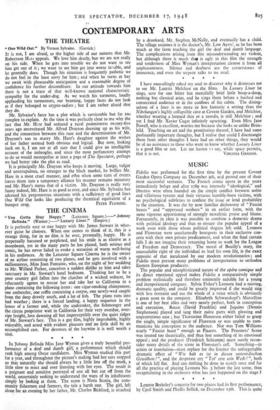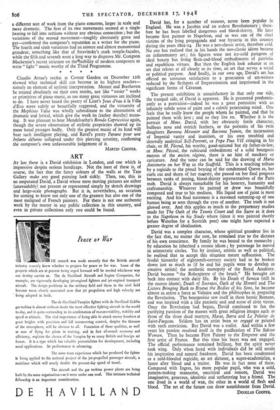MUSIC
Fidelio was performed for the first time by the present Covent Garden Opera Company on December 9th, and proved one of their most successful ventures. The French comic opera in the years immediately before and after 1789 was intensely "ideological," and librettos were often founded on the simple conflict between noble and villainous tyrants and their virtuous humbly-born victims, with no psychological subtleties to confuse the issue or lend probability to the situation. It was the by now familiar dichotomy of "Fascist beasts" and "oppressed workers" in an earlier form, with the same vigorous apportioning of strongly moralistic praise and blame. Fortunately, in 1800 it was possible to combine a domestic drama with political ideology and thus to ensure the popular appeal of a work even with those whom political slogans left cold. Leonora and Florestan were unashamedly bourgeois in their exclusive con- cern with their own private predicament, and when the final curtain falls I do not imagine their returning home to work for the League of Freedom and Democracy. The moral of Bouilly's story, the unassailable right of the individual to lead his own life, is the exact opposite of that inculcated by our modern revolutionaries ; and Fidelio must present many problems of interpretation to orthodox Eastern European producers.
The popular and unsophisticated nature of the opera comique and its direct emotional appeal makes Fidelio a comparatively simple problem stylistically and therefore eminently suitable for a young and inexperienced company. Sylvia Fisher' S Leonora had a moving, dramatic quality, and could be greatly improved if she would sing • with less restraint and use the whole of a voice which is obviously a great asset to the company. Elizabeth Schwarzkopf's Marcelline is one of her best roles and very nearly perfect, both in conception and execution. Rocco (David Franklin) and Jaquino (Dennis Stephenson) played and sang their naive parts with pleasing and unpretentious ease ; but Thorsteinn Hanneson either failed to grasp the single, simple significance of Florestan or was unable to com- municate his conception to the audience. Nor was Tom Williams nearly "Fascist beast" enough as Pizarro. The Prisoners' Scene was treated too theatrically, and thus lost something of its emotional appeal ; and the producer (Friedrich Schramm) must surely recon- sider many details of the scene in Florestan's cell. Something—in action or translation—must replace for the listener the unforgettable dramatic effect of "Wie halt es ist in diesen unterirdischen Gewalben ! ", and the desperate cry "Tot' erst sein Weib I", both of which fell flat. And can nothing be done to scotch once and for all the practice of playing Leonora No. 3 before the last scene, thus recapitulating in the orchestra what has just happened on the stage ?
* * * * Lennox Berkeley's concerto for two pianos had its first performance, by Cyril Smith and Phyllis Sellick, on December 13th. This is quite a different sort of work from the piano concerto, larger in scale and more dramatic. The first of its two movements seemed at a single hearing to fall into sections without any obvious connection ; but the variations of the second movement—roughly alternately grave and gay—confirmed the composer's reputation as a writer for the piano. The fourth and sixth variations had an austere and almost monumental grandeur, something like that of Stravinsky's stark temple-facades, while the fifth and seventh went a long way to disprove Mr. Compton Mackenzie's recent stricture on thealnability of modern composers to write " light " music worthy of the Third Programme.
* * * *
Claudio Arrau's recital at Covent Garden on December 12th showed what technical skill can become in its highest reaches— namely an element of stylistic interpretation. Mozart and Beethoven he treated absolutely on their own merits, not like "easier" works or primitives of piano music, as too many great virtuosos are inclined to do. I have never heard the poetry of Liszt's Yeux d'eau a la Villa d'Este more subtly or beautifully suggested, and the virtuosity of the Mephisto Valse was wholly subordinate to the alternations of dramatic and lyrical, which give the work its (rather sketchy) mean- ing. It was pleasant to hear Mendelssohn's Rondo Capriccios° again, though the severe observation of stylistic proprieties showed up its more banal passages badly. Only the greatest music of its kind will bear such intelligent playing, and Ravers pretty Pavane pour une Infante defunte collapsed under this piercing scrutiny, confirming the composer's own unfavourable judgement of it.
MARTIN COOPER.



































 Previous page
Previous page